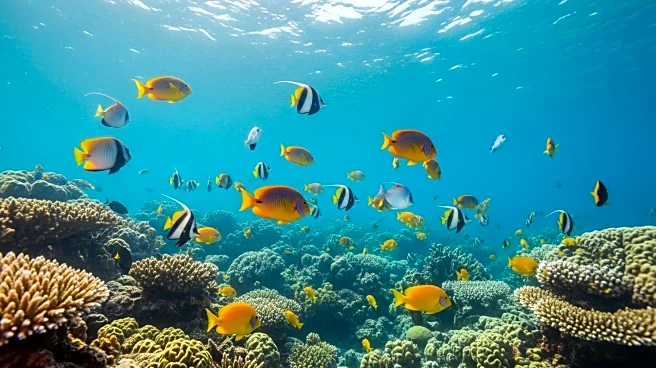What's Happening?
The World Trade Organization (WTO) has enacted a landmark agreement aimed at curbing billions of dollars in subsidies that contribute to overfishing. This agreement, which took over 20 years to negotiate, prohibits governments from providing subsidies for overfished stocks and for fishing in international waters beyond their jurisdictions. The deal was formally ratified by Brazil, Kenya, Tonga, and Vietnam, achieving the necessary support from two-thirds of WTO members. The agreement is seen as a significant step towards allowing global fish stocks to recover, benefiting local fishers who rely on healthy oceans. According to a 2019 study in Marine Policy, governments worldwide pay approximately $35.4 billion annually to their fishing fleets, including fuel subsidies that enable fishing in distant oceans. The top subsidizers include China, the EU, the United States, South Korea, and Japan, although not all are covered by the WTO deal.
Why It's Important?
The implementation of this agreement is crucial for the sustainability of global fish stocks, which are vital for the livelihoods of millions of people worldwide. By restricting subsidies that lead to overfishing, the WTO aims to promote healthier ocean ecosystems and support local fishing communities. The deal also includes provisions for poorer states to access a fund to help them transition into compliance with the new rules. This move is expected to reduce the environmental impact of overfishing and encourage more responsible fishing practices. The agreement's success could set a precedent for future international efforts to address other environmental and economic challenges.
What's Next?
The current agreement will expire in four years unless more comprehensive rules are established. Negotiations on additional fishing regulations, which cover contentious issues not included in the initial deal, are ongoing. Developing economies, such as India, are seeking exemptions that other states find impractical, complicating the negotiation process. WTO Director-General Ngozi Okonjo-Iweala has expressed optimism that the organization can either finalize these talks or find a way to prevent the expiration of the first deal.
Beyond the Headlines
The agreement highlights the complex interplay between environmental sustainability and economic interests. It underscores the need for international cooperation in addressing global challenges like overfishing. The deal also raises questions about the balance between supporting local economies and protecting natural resources, as developing countries seek exemptions to maintain their fishing industries.









